Is your refrigerator showing signs of rust on its exterior?
It’s not just an eyesore; it can also be a sign of underlying issues. But what exactly causes rust to form on the outside of a refrigerator?
In this article, we’ll dive into the factors behind this pesky problem and explore the science of corrosion.
Discover how moisture, environmental factors, and other culprits contribute to the formation of rust.
Moreover, we’ll share effective refrigerator rust removal solutions.
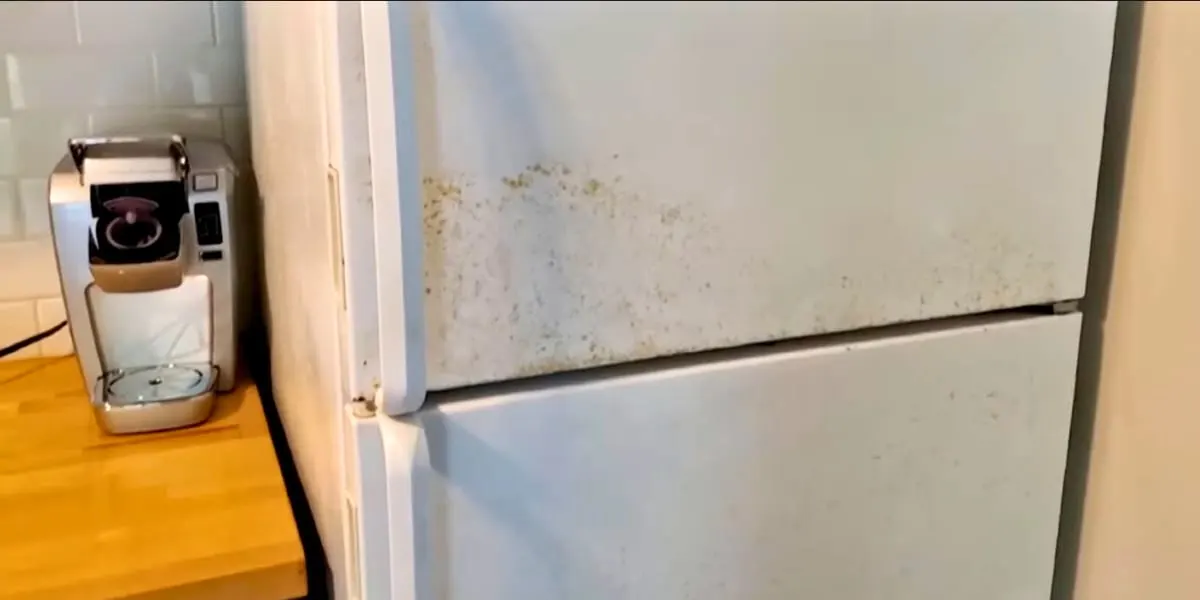
What Causes Rust on the Outside of a Refrigerator?
Rust on the outside of a refrigerator can be caused by several factors:
Moisture:
Iron (or alloys that contain iron, like steel) rusts when exposed to oxygen and moisture over time. Your refrigerator, if made of these materials, isn’t exempt from this process.
Refrigerators can rust even with painted finishes or finishes that are poorly absorbed by condensation.
Moisture can come from various sources, including spills, leaks, or high humidity.
Regularly cleaning your fridge and maintaining a dry environment can help prevent rust formation.
Damage to the Finish:
Your refrigerator comes with a finish or coating designed to protect the metal underneath.
In the event of scratches, dents, or other physical damage, the metal underneath is exposed.
Once exposed, the metal is vulnerable to air and moisture, leading to rust. Keeping an eye out for damage and addressing any that is found can prevent rust.
Age:
As your refrigerator ages, so does its protective finish. It will deteriorate over time and become less effective at keeping moisture away from metal.
A natural process, this can be slowed by cleaning and repairing your refrigerator on a regular basis.
Poor Quality Material:
Not all refrigerators are created equal. Some may use lower-quality metals or a thin, poorly applied finish.
This makes these refrigerators more susceptible to rust, even with good care.
Buying appliances from reputable manufacturers that meet quality standards ensures a long lifespan.
High Humidity Environment:
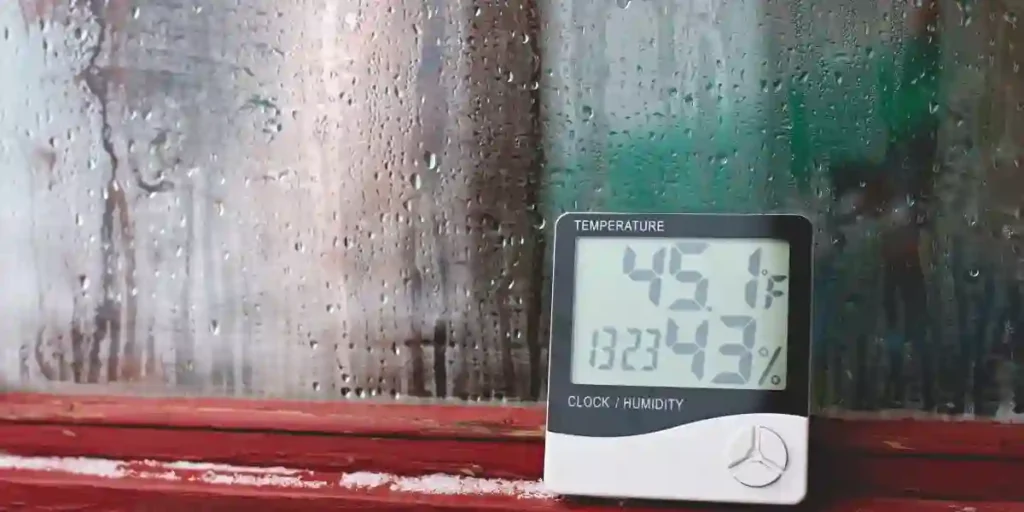
High humidity means more moisture in the air. Rust can develop more quickly in humid environments, such as coastal regions or basements.
Consider a dehumidifier for high-humidity areas or make sure your kitchen is well-ventilated.
Chemical Exposure:
A harsh cleaning agent or bleach can damage the finish on your refrigerator, increasing the risk of rust.
Use only mild detergents or cleaning agents when cleaning your refrigerator’s exterior.
Rusting can also be caused by spilled acidic foods and beverages not immediately cleaned up.
Tips for Preventing Rust on Your Refrigerator
Regular maintenance and proactive measures are key to preventing refrigerator rust. Here are some practical tips:
Regular Cleaning:
Cleaning the refrigerator should be part of your regular kitchen cleaning routine. Use a mild detergent diluted in warm water and a soft cloth or sponge.
Gently wipe the surfaces to remove any dirt, grime, or residue. Afterward, make sure the surface is thoroughly dried, as water left on the surface can lead to rust.
Quick Spill Management:
Food or drink spills can be acidic and can damage the surface of the refrigerator if left unattended. Always clean up spills immediately to minimize the risk.
This includes spills inside the fridge and on the exterior. Use a mild cleaner and warm water, and be sure to dry the area thoroughly afterward.
Use Appropriate Cleaning Agents:
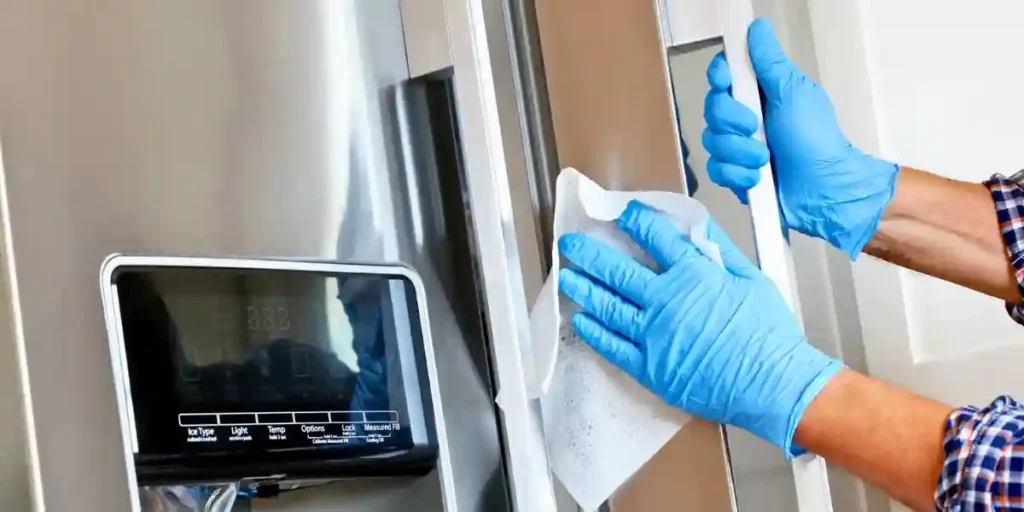
Rusting can occur on refrigerators when harsh chemical or abrasive cleaning products are used.
Always choose mild cleaning agents, and avoid products with bleach or ammonia. For recommended cleaning products and procedures, consult your refrigerator’s owner’s manual.
Check for Damage Regularly:
If you inspect your fridge regularly, you can catch potential problems before they become serious.
Look for dings, scratches, or chips in the paint. Apply a small amount of clear nail polish to seal the area and prevent rust if you notice any.
Control Humidity:
Humidity increases the likelihood of rust since more moisture condenses on your fridge when it’s humid.
You might want to consider using a dehumidifier in your kitchen if it tends to be humid.
Also, ensure that your kitchen is well-ventilated, as this can help reduce humidity levels.
Avoid Direct Water Exposure:
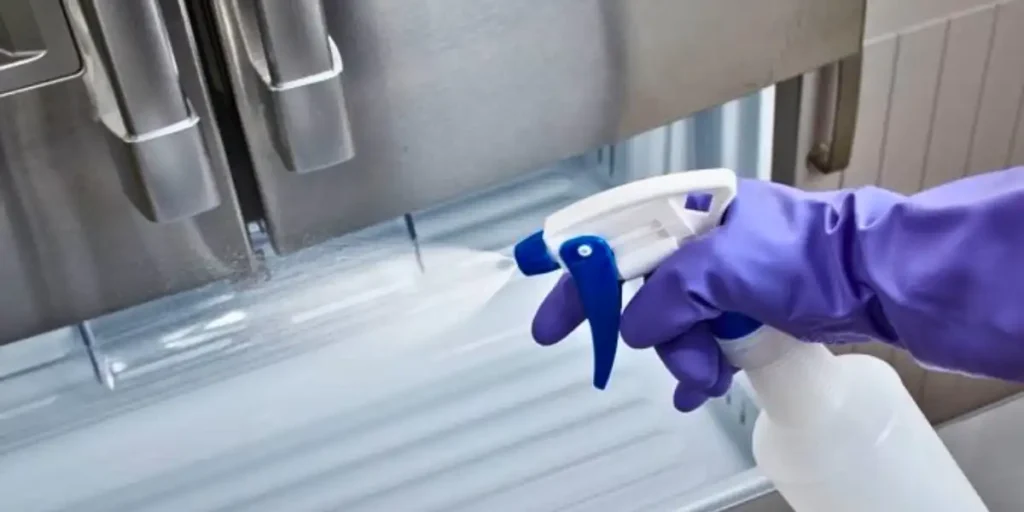
Try to position your refrigerator in a place where it is unlikely to come into contact with water.
Avoid placing the sink or dishwasher near a window, where rain could get in, or near the sink or dishwasher.
Use Rust-Resistant Primer and Paint:
Chipped or scratched areas on your fridge can benefit from primer and paint that resists rust.
Designed to protect against moisture and oxygen that cause rust, these products provide protection.
Use a Rust Converter:
Rust converters can stop rusting and prepare areas for repainting if rust has already formed.
Rust converters chemically react with the rust to neutralize it and create a paintable surface.
They can be a good option for addressing small rust spots before they become a bigger problem.
How to Remove Rust from the Outside of a Refrigerator
Here’s a step-by-step process to remove rust from the exterior of your refrigerator:
Materials you’ll need:
- Rubber gloves
- Protective goggles
- Mild dish soap
- Warm water
- Soft cloth or sponge
- Rust remover or baking soda
- A small brush (a toothbrush can work)
- Sandpaper (medium and fine grit)
- Primer (rust inhibiting if possible)
- Paint to match your refrigerator
- Small paintbrush
Steps:
Prepare:
To protect yourself from rust particles or cleaning chemicals, wear rubber gloves and protective goggles.
If the rust is severe or extensive, you might want to consider wearing a dust mask as well.
Clean the Area:
Begin by cleaning the rusted area. Mix some mild dish soap in warm water. Scrub the rusted area gently with a soft cloth or sponge to remove dirt, grease, or loose rust particles.
This helps to expose the rusted area more clearly for treatment. Once done, dry the surface thoroughly using a dry cloth or towel.
Apply Rust Remover or Baking Soda Paste:
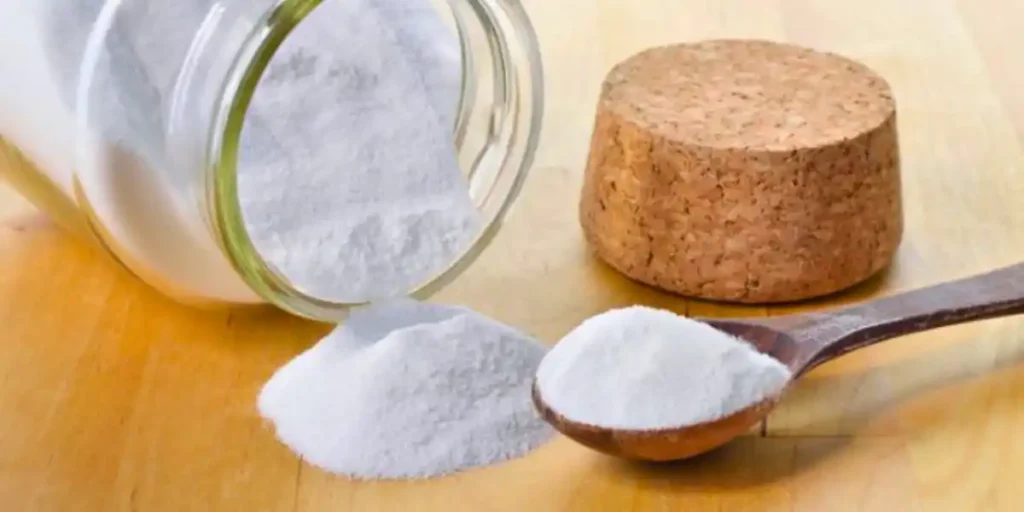
Typically, commercial rust removers contain chemicals specifically designed to dissolve rust. Follow the instructions on the product’s label.
If you prefer a more natural approach, you can make a paste of baking soda and water (about 1 part baking soda to 1 part water).
Apply this paste to the rusted area. Baking soda is mildly abrasive and can help to scrub away rust without damaging the metal beneath.
Scrub:
Use a small brush (an old toothbrush can work well) to scrub the rusted area gently. You want to remove as much rust as you can without damaging the paintwork or the metal beneath. Start with light pressure and increase as necessary.
Sand the Area:
If the rust remains even after scrubbing, sanding may be required. Scrape the stubborn rust with medium-grit sandpaper, then smooth with fine-grit sandpaper.
During this process, make sure not to dig too deeply into the metal or scratch the paintwork.
Clean Again:
After removing all the rust, rinse with warm soapy water again to get rid of any lingering particles.
Dry the area thoroughly. This ensures a clean surface for the primer and paints to adhere to.
Prime and Paint:
Apply a coat of primer to the treated area. A rust-inhibiting primer is a good choice as it provides an extra level of protection against future rusting.
Allow the primer to dry according to the manufacturer’s instructions. Once the primer is dry, apply paint that matches your refrigerator’s color.
One thick coat is usually better than several thin ones, each drying completely before adding the next.
Dry:
Let the paint dry fully before touching or cleaning the area. Allow the paint time to harden and provide maximum protection against future corrosion.
FAQs About Rust on Refrigerators
How Does A Refrigerator’s Finish Affect Rusting?
The finish protects the iron-based metal from moisture and oxygen in the environment. The underlying metal is exposed when scratches, dents, or wear and tear damage the finish.
Rusting occurs when exposed metal interacts with oxygen and moisture, resulting in oxidation.
Can Older Refrigerators Be More Prone To Rust?
As refrigerators age, their protective finish can wear away, exposing the underlying metal.
Physical impacts, excessive cleaning, and harsh cleaning products can also accelerate rust.
How Does Living In A Humid Environment Contribute To Rust?
Living in a humid environment means there is more moisture in the air. This moisture can condense on the surface of your refrigerator.
Any exposed metal (such as a scratch in the finish) can rust when this moisture comes in contact. This is why rust is a common problem in coastal areas, where humidity levels are generally high.
Can Cleaning Products Cause Rust On My Refrigerator?
Yes, indeed. Harsh cleaning products can cause damage to your refrigerator’s finish, potentially leading to rust. As a result, these products can be abrasive or contain chemicals that break down finishes.
Use mild cleaning agents and test any new cleaning product on an inconspicuous area first.
What Can I Do If My Refrigerator Is Already Rusting?
You should address rust on your refrigerator as soon as possible to prevent further damage. Start by cleaning the area and then apply a commercial rust remover.
After the rust has been removed, you may need to sand the area lightly to smooth out the surface. Then apply a rust-inhibiting primer and paint that matches the rest of your refrigerator.
The following steps should help restore your refrigerator’s appearance and prevent future rust.
Conclusion
Your refrigerator doesn’t have to fall prey to rust. Rust occurs when moisture and oxygen are exposed, especially on older or damaged refrigerators.
A gentle cleaning regimen and gentle products can extend the life of your appliance.
